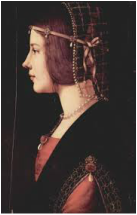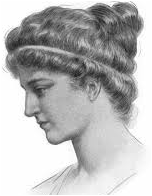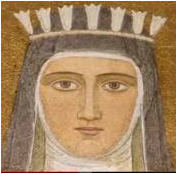Posted by: Dale Griffiths Stamos

Everyone has heard of Leonardo da Vinci. But how many have heard of Isabella d’Este? She was an extraordinary multi-talented woman who lived at the same time as da Vinci (he even did a sketch of her) and was called by diplomat Niccolo da Correggio “The First Lady of the World.” Precocious from an early age, Isabella received a classical education, excelling at history, Latin & Greek, and able to discourse on affairs of state. She was also a talented singer and musician, and an innovator of new dances. She wrote thousands of letters, commenting on everything from politics to war. When later married to the Duke of Mantua, she stepped in to rule Mantua during a time he was a war hostage. During those three years, she was a confident and assertive leader, even, at one point, persuading King Louis XII of France, not to send troops against Mantua. Her husband, upon his return, was so humiliated by her superior political skills that their marriage was never the same after. Isabella was also a patron of the arts, and a fashion leader, whose style was copied by women throughout Italy and at the French court. All, by the way, as a mother of eight children!
Isabella d’Este is not the only Renaissance-style woman from the past you’ve probably never heard of. From the beginning of history, there have existed these exceptional women. And one of the things our book, RenWomen, will do is bring some of these women to your attention.
Isabella d’Este is not the only Renaissance-style woman from the past you’ve probably never heard of. From the beginning of history, there have existed these exceptional women. And one of the things our book, RenWomen, will do is bring some of these women to your attention.

Take Hypatia, for example. She lived during the fourth century AD and was a Neo-Platonist who ran a school where she taught philosophy, astronomy and mathematics. She was also an exceptional orator and spoke publicly to men and women alike. A quote from a 5th century historian described her in this way: “There was a woman at Alexandria named Hypatia who made such attainments in literature and science, as to far surpass all the philosophers of her own time.” Despite her popularity, Hypatia died tragically at the hands of a Christian mob, who falsely thought her entangled in a religious and political feud of the time.

Or Hildegaarde de Bingen, a medieval nun who wrote voluminous works on theology, astronomy, medicine, and philosophy. She also composed beautiful music, supervised illuminations of her mystical visions, wrote poetry and morality plays and even cookbooks! Word of Hildegard’s striking visions reached the pope, and he commanded she write them down. Her renown and influence spread wide and within a few years she was carrying on correspondence with kings, theologians and scholars.
And the list goes on, be it 19th century Margaret Fuller: journalist, critic, teacher, magazine editor, and women’s rights advocate. Or better known figures through the ages like Elizabeth I, Abigail Adams, or Eleanor Roosevelt. In the 20th century, perhaps the most surprising RenWoman would be Hedy Lamaar who is most known for being an accomplished and beautiful actress. But she was also mathematically gifted, and helped develop a frequency-hopping invention with the purpose of preventing enemies from detecting American radio-controlled torpedos.
Why have most of these women not gone down in history, as so many exceptional men of their times did? Well, there is the old saw, that you need only look at who has written history. (In similar fashion, so many remarkable people of color have been passed over in the history books.)
But as we look at examples of amazing modern day Renaissance women in our book RenWomen: What Modern Renaissance Women Have to Teach Us About Living Rich, Full Lives, it is important to also remember on whose shoulders they stand.
Why have most of these women not gone down in history, as so many exceptional men of their times did? Well, there is the old saw, that you need only look at who has written history. (In similar fashion, so many remarkable people of color have been passed over in the history books.)
But as we look at examples of amazing modern day Renaissance women in our book RenWomen: What Modern Renaissance Women Have to Teach Us About Living Rich, Full Lives, it is important to also remember on whose shoulders they stand.


 RSS Feed
RSS Feed